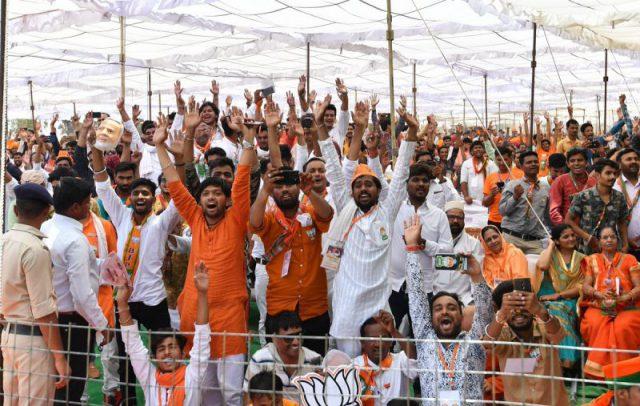Modi’s re-election and the future of Indian democracy
Posted By Mohammed Ayoob on May 24, 2019 @ 06:00

In what amounts to a clean sweep, Prime Minister Narendra Modi and his Bharatiya Janata Party have won a fresh mandate from the Indian electorate to rule for another five years. There are many factors that have contributed to the outcome.
Probably the most important was the BJP’s success in making this into a presidential-style election and turning it into a referendum on Modi’s charismatic and pugnacious persona. This strategy was aided by the opposition’s inability to project a single credible prime ministerial candidate because of the lack of consensus among the opposition parties. There were several reasons for this, including the oversized ambitions of several party leaders and the fact that in a number of states regional parties that formed the bulk of the opposition to the BJP were locally pitted against the Indian National Congress party.
BJP exploited the ‘dynastic’ nature [1] of the Congress party to the hilt, especially after Priyanka Gandhi Vadra, the sister of party president Rahul Gandhi, was inducted into the Congress leadership in the run-up to the elections. The Congress also played into the BJP’s hands by running a largely negative campaign against Modi personally. That strategy boomeranged: it allowed Modi to hog the limelight and relegate his government’s lackluster policy performance to the background.
Policy issues turned out to be of marginal concern to the electorate. This was surprising given the visible distress in the agricultural sector, the highest rate of unemployment in 45 years, the mess created by demonetisation in 2016 that affected the average Indian adversely, and the impact of the goods and services tax, which created resentment in much of the business sector. Macroeconomic indicators also signalled a noticeable slowdown [2] in economic growth, but much of this data either was fudged by the government or was too complicated for most voters to understand.
The election was decided on emotional rather than policy issues. Modi successfully made national security a central issue in his election campaign. He was aided in this endeavour by a major terrorist attack in Kashmir in February for which a Pakistan-based terrorist outfit claimed responsibility. The terrorist attack and the Indian air strike deep into Pakistani territory in response to it provided the BJP with an election bonanza by creating the image of a decisive prime minister who could teach Pakistan a lesson even at the cost of risking a war between the nuclear-armed neighbors.
BJP’s exploitation of national security as a major election theme enabled it to talk up its credentials as the primary proponent of Hindu nationalism. The BJP media trolls linked any attempt by the Congress to counter Modi’s national security narrative and the hyper-nationalism it engineered to its presumed policy of ‘Muslim appeasement’ and the consequent ‘soft’ policy towards Pakistan.
Anticipating such a move, the Congress leadership began to emphasise the party’s Hindu credentials more than a year ago by adopting a ‘soft’ Hindutva posture against the ‘hard’ Hindutva of the BJP. By doing so, the Congress turned itself into the BJP’s B team and sacrificed its commitment to India as a plural society. But the strategy failed miserably because as a pale imitation of the BJP’s aggressive Hindutva, the Congress couldn’t compete with the genuine article.
The equating of Hindu nationalism with Indian nationalism is now taken for granted by large sections of the Indian population. This is demonstrated by the fact that Yogi Adityanath—the chief minister of India’s largest state, Uttar Pradesh, and an intensely anti-Muslim Hindu monk—was the second most sought-after speaker after Modi in the BJP’s election rallies across the country. The media amplified the majoritarian and hyper-nationalist instincts in the country and often conflated the two. This helped BJP propagandists to denigrate the opposition’s attempts to ask the government legitimate questions about national security issues.
One should also not ignore the fact that a major contributor [3] to the BJP’s victory was the disciplined and ideologically committed cadres of the Rashtriya Swayamsevak Sangh, or RSS, the parent body of the BJP and the ideological font of Hindu nationalism. These cadres catalysed pro-BJP voters to turn out in large numbers. In contrast, the Congress as an amorphous organisation is bereft of committed cadres. Its so-called workers are largely opportunists or hired hands. Regional parties, such as the Trinamool Congress in West Bengal, that have committed cadres did reasonably well in the face of the BJP juggernaut but are incapable of providing a pan-national alternative to the ruling party.
The BJP victory is likely to have long-lasting effects on the Indian polity. The party has been accused of subverting the autonomy of institutions, such as the Election Commission and the Central Bureau of Investigations, that are critical to the success of democracy in the country. Under Modi, it has also been blamed for promoting a form of populism and a cult of personality that could be conducive to the rise of authoritarianism.
India needs a strong and unified opposition that’s committed to principles of liberal democracy in order to keep these tendencies in check. However, this election indicates that no such formation [4] is currently on the horizon. In the absence of a credible alternative to the BJP, there’s a danger that, while procedural democracy may endure, the liberal spirit undergirding it could be in danger of extinction.
Article printed from The Strategist: https://aspistrategist.ru
URL to article: /modis-re-election-and-the-future-of-indian-democracy/
URLs in this post:
[1] exploited the ‘dynastic’ nature: https://www.thehindu.com/opinion/op-ed/flawed-political-move/article26122864.ece
[2] noticeable slowdown: https://www.businesstoday.in/opinion/business-wise/slowdown-grips-indian-economy-how-do-we-emerge-unscathed/story/341714.html
[3] a major contributor: https://www.theguardian.com/commentisfree/2019/may/21/five-more-years-narendra-modi-india-dark-place
[4] no such formation: https://www.thehindu.com/opinion/op-ed/is-the-future-of-indian-democracy-secure/article27153232.ece
Click here to print.